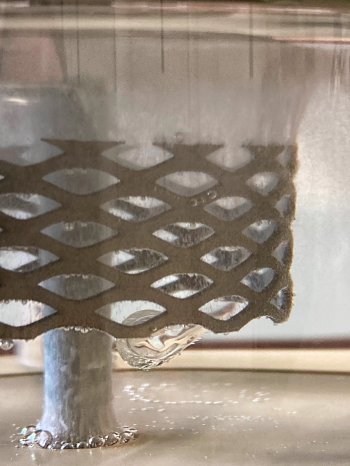The transformation to a hydrogen economy involves challenges at the levels of systems, components and materials. When hydrogen is used in stationary and mobile systems, it can potentially cause embrittlement in metals and thereby significantly affect the service life of these systems. “Case-by-case testing is frequently necessary to ensure the safe operation of components in these conditions”, explains Dr Christopher Tom Engler, material expert at TÜV SÜD Chemie Service GmbH in Frankfurt am Main. Testing in accordance with the US standard ANSI-CSA CHMC 1-2014 generally requires conducting trials of metal specimens in compressed hydrogen applications. However, this approach is a relatively costly one. “With this in mind, we have opted for another approach in our ultra-modern materials laboratory in Kalbach”, says Dr Engler, explaining, “We load the specimens with hydrogen produced by electrochemical reactions.” The results of mechanical load tests and electron-microscope investigations then show how the materials will react in hydrogen applications. Using this test method, the TÜV SÜD experts produce high quality and reliable results albeit at significantly lower costs compared to the conventional test method with compressed hydrogen. Another benefit for TÜV SÜD customers is that on top of the results of material testing, they also receive a certificate from the same source enabling them to demonstrate the H2 compatibility of their products.
Safely operating components and systems
In addition to materials, TÜV SÜD also provides testing and certification of a host of different components with respect to their suitability for use in hydrogen applications. At the hydrogen testing laboratory in Garching near Munich, for example, pressure controllers, sensors, valves, lines or manifold systems are examined in detail. “We have the necessary equipment and know-how to offer reliable and cost-effective testing of components and systems for their compatibility with, and safety in, hydrogen applications. After verification of their compatibility, we can then issue the relevant certificates”, says Martin Sekura, Hydrogen Business Development Manager at TÜV SÜD Product Service GmbH. Working with an international automotive industry supplier and one of the leading manufacturers of gas distribution systems (lines and valves) for hydrogen-powered passenger cars and trucks, TÜV SÜD performed benchmarking of the various test methods within the scope of a research cooperation. In this project, the TÜV SÜD experts examined low-alloy and high-alloy carbon steels for their vulnerability to hydrogen embrittlement in various states of thermal treatment. Martin Sekura explains, “This project supplies our cooperation partners with comprehensive information about the behaviour of the materials used in their systems and verifies that their products are compatible with compressed hydrogen – a significant advantage in terms of product safety and transparency!”
Further information: https://www.tuvsud.com/...


